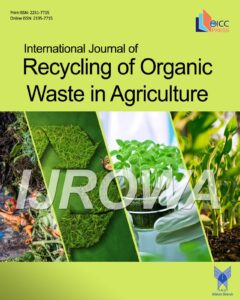Use of agro-industrial waste for the production of compost as a sustainable management alternative
Authors
Abstract
Purpose: The objective of this research is to evaluate the quality of the compost generated from agro-industrial storage residues composed of soybean, corn, wheat, oats, sunflower, and canola remains, as an environmental management alternative.
Method: Standardized analytical techniques were used. The samples were obtained in situ. The parameters analyzed were pH, nitrogen, phosphorus, potassium, sodium, calcium, copper, zinc, magnesium, iron, manganese, ash, and humidity. The microbial populations were quantified and the most predominant morphotypes were isolated to carry out a description and identification. The analysis of the environmental benefits of the compost production process was valued by calculating the importance of considering the positive and negative impacts.
Results: The physical-chemical characterization of the compost presented 63.8% humidity; 1.35% nitrogen; 0.86% potassium; 0.51% phosphorus; 0.04% sodium; 1.52% calcium; 0.01% copper; 0.02% zinc; 0.56% magnesium; 0.07% manganese; 8.61% iron; 63.04% ash and a pH of 8.52, which indicate a high nutritional value for plants. The genera identified were Aspergillus spp., Penicillium spp., and Fusarium spp. The analysis of the environmental benefit resulted in 4 negative moderate impacts and 11 positive severe and moderate impacts.
Conclusion: The study reveals that the transformation of this waste into compost not only contributes to reducing the amount of waste generated by the agri-food industry but also offers multiple environmental and agronomic benefits. The use of agro-industrial residues for the production of compost is a sustainable management alternative.



